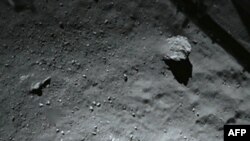A European probe has begun drilling into a comet to collect scientific data, but a problem at landing means the probe could run out of power, making it impossible to access its results.
The Philae probe landed on the comet Wednesday, but European Space Agency officials say the harpoons that were supposed to anchor it to the surface failed to deploy properly. That caused the washing machine-sized craft to bounce off the comet twice, before coming to rest in the shadow of a cliff.
The cliff is believed to be blocking sunlight from the probe's solar panels, which means its battery power will soon run out.
Scientists say the probe was able to deploy its drill 25 centimeters Friday, but that they have lost the link to its data.
ESA officials are now looking at options to move the probe's panels into a better position where they get more light. But they say the battery power might be too low at the next attempt to contact the probe.
Scientists hope studying samples of material below the comet's surface will unlock details about how the planets evolved.
Comets date back to the formation of the solar system 4.6 billion years ago. Scientists suspect impacting comets delivered water to the young Earth.
Philae became the first-ever man made object to land on a comet when it touched down Wednesday, seven hours after separating from its Rosetta mothership.
The Rosetta became the first ever spacecraft to rendezvous with a comet back in August, after a 10-year journey that included a slingshot flight path around Earth and Mars before it could gain enough speed to reach Comet 67P.
Rosetta is set to escort Comet 67P for the next year and observe it as it heads towards the sun.










